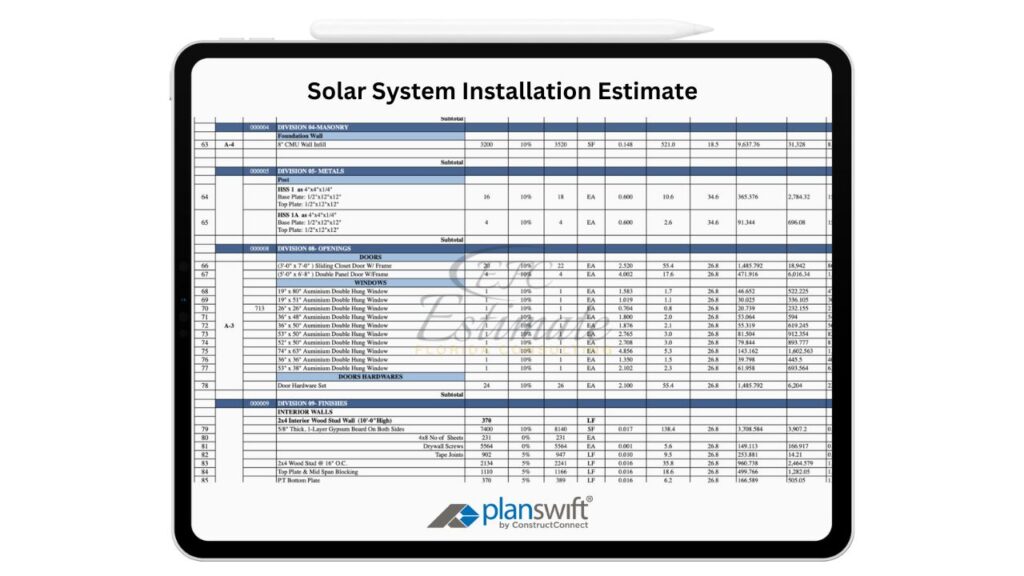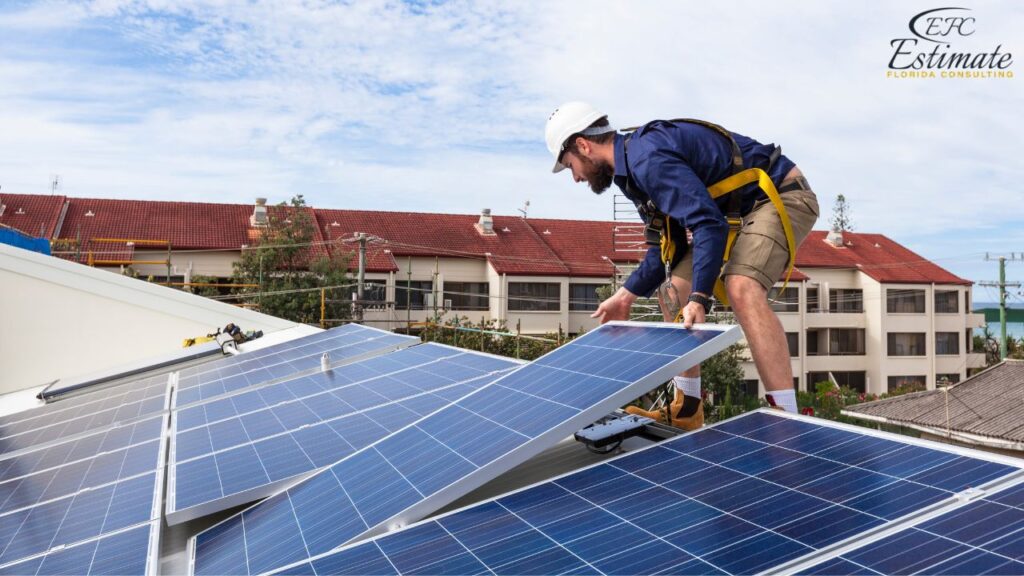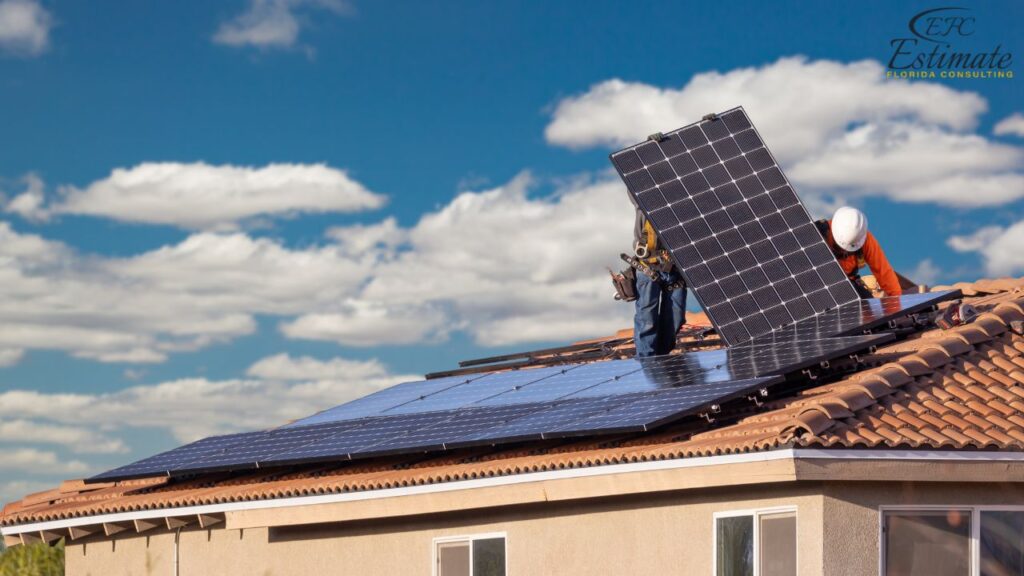90% More Chances to Win Projects With Our Estimate!
- Multi-Family Building
- Hotel Building
- Hospital Building
- Warehouse Building
- School & University Building
- High-Rise Building
- Shopping Complex
- Data Center Building

Solar energy has gained immense popularity as a sustainable and eco-friendly solution for homeowners seeking to reduce energy costs and reliance on traditional energy sources. This article serves as a comprehensive guide to estimating the costs associated with solar system installation, tailored specifically for homeowners in Florida. Understanding the financial implications is crucial for making informed decisions about solar energy investments.

Understanding the costs associated with different solar system sizes can help homeowners make informed decisions.
System Size | Average Cost |
3 kW | $12,600 – $21,000 |
5 kW | $16,800 – $28,000 |
Small residential systems, typically ranging from 3 kW to 5 kW, are ideal for homes with lower energy needs. These systems can significantly reduce electricity bills and often pay for themselves within 5 to 7 years, depending on local utility rates and available incentives.
System Size | Average Cost |
7 kW | $25,200 – $33,600 |
10 kW | $30,800 – $42,000 |
Medium residential systems, between 7 kW and 10 kW, cater to larger households or those with higher energy consumption. The return on investment can be compelling, especially in areas with abundant sunlight and high energy costs. These systems also offer a larger array of panels, leading to increased energy generation.
System Size | Average Cost |
12 kW | $42,000 – $53,000 |
15 kW | $49,000 – $63,000 |
Large residential systems of 12 kW or more are suitable for expansive homes or properties with energy-intensive appliances, such as swimming pools or electric heating. These systems provide the opportunity for significant energy savings and may enable homeowners to achieve net-zero energy consumption.
System Size | Average Cost |
25 kW | $84,000 – $112,000 |
50 kW | $140,000 – $210,000 |
Commercial solar systems are typically designed for businesses and can vary widely in size, often starting at 25 kW and exceeding 100 kW. The upfront costs can be substantial; however, commercial systems often benefit from lower costs per watt due to the scale of installation. Additionally, businesses may qualify for various tax incentives and rebates that can offset installation expenses.
With the increasing demand for energy independence, many homeowners consider incorporating battery storage into their solar systems. Battery storage allows for energy to be saved for use during nighttime or cloudy days, enhancing the efficiency of solar systems.
Battery Type | Average Cost (per kWh) |
Lithium-Ion Batteries | $560 – $980 |
Lead-Acid Batteries | $280 – $420 |
Typical battery systems range in size from 5 kWh to 20 kWh, and the total installation costs generally fall between $7,000 and $21,000, depending on the battery type and system configuration. Investing in battery storage can provide greater autonomy from the grid, especially in areas prone to outages or where energy rates fluctuate.
Several factors contribute to the overall cost of solar system installation, which homeowners should consider before committing to a project.
The type of solar panels chosen can significantly affect installation costs. Common types include:

The complexity of the installation can impact labor costs. Factors such as roof type, access, and the need for additional structural support can increase labor costs, typically ranging from $2,000 to $5,000 for complex installations.
Homeowners should account for permitting and inspection fees, which can add $500 to $1,500 to the overall installation cost. Local regulations and requirements may vary, so it’s essential to research these factors beforehand.
When evaluating solar systems, it is essential to compare different options based on factors such as efficiency, longevity, warranty, and costs.

Various federal, state, and local incentives can significantly reduce the costs associated with solar system installation.
Taking advantage of these incentives can substantially lower your out-of-pocket expenses and improve your return on investment.
Investing in solar energy not only contributes to environmental sustainability but can also yield significant financial returns over time.
While solar systems generally require minimal maintenance, homeowners should account for occasional operational costs to ensure peak performance:
Understanding these costs helps homeowners plan for ongoing maintenance and ensures that their solar systems continue to perform efficiently over their lifetime.

Solar energy presents an attractive investment for Florida homeowners looking to reduce energy costs and embrace sustainable practices. By understanding the various costs associated with solar system installation and the financial benefits, homeowners can make informed decisions. With numerous incentives available, now is an opportune time to explore solar options and enjoy the advantages of clean, renewable energy.
The average cost to install solar panels in Florida varies based on the system size and type. For small residential systems (3 kW to 5 kW), the cost ranges from $12,600 to $28,000. For medium systems (7 kW to 10 kW), the cost is approximately $25,200 to $42,000. Large systems (12 kW to 15 kW) can cost between $42,000 and $63,000. Factors such as the type of solar panels, installation complexity, and additional fees can influence these prices.
For a typical 2,000 sq ft house, a medium-sized solar system (around 7 kW to 10 kW) is usually appropriate, which can cost between $25,200 and $42,000. The actual cost may vary based on the home's energy consumption, the specific solar panel type, and any additional equipment such as inverters or battery storage.
Yes, solar panels are generally worth it in Florida due to the state's abundant sunshine and high electricity costs. Homeowners can expect significant savings on their energy bills, often reducing or eliminating monthly electricity costs. Additionally, the increase in home value and the availability of incentives make solar energy a financially sound investment.
The payback period for solar panels in Florida typically ranges from 5 to 10 years. This period depends on factors such as the size of the system, local utility rates, and available incentives. With various rebates and tax credits, homeowners can achieve a quicker return on their investment.
Yes, Florida offers several incentives to help offset the cost of solar panel installation. This includes state-level rebates, grants, and various utility incentives. Additionally, the federal Investment Tax Credit (ITC) allows homeowners to claim a tax credit for a significant percentage of their installation costs, typically around 26% in 2023.
Yes, homeowners in Florida can benefit from tax deductions related to solar panel installation. The federal Investment Tax Credit (ITC) allows you to deduct a percentage of your solar system installation costs from your federal taxes. This can significantly reduce the overall cost of solar panels.
Solar panels in Florida usually take about 5 to 10 years to pay for themselves, depending on the size of the system, energy consumption, and available incentives. After this period, homeowners can enjoy significant savings on electricity bills and increased home value.
Some insurance companies may be hesitant to insure homes with solar panels due to concerns about installation quality, potential damage during severe weather, and the increased risk of electrical fires. Homeowners are encouraged to work with reputable solar installers and provide documentation of proper installation and maintenance to help mitigate these concerns.
At Estimate Florida Consulting, we offer detailed cost estimates across all major trades, ensuring no part of your project is overlooked. From the foundation to the finishing touches, our trade-specific estimates provide you with a complete and accurate breakdown of costs for any type of construction project.

We take pride in delivering accurate, timely, and reliable estimates that help contractors and builders win more projects. Our clients consistently praise our attention to detail, fast turnaround times, and the positive impact our estimates have on their businesses.
Estimate Florida Consulting has helped us win more bids with their fast and accurate estimates. We trust them for every project!

Submit your project plans, blueprints, or relevant documents through our online form or via email.
We’ll review your project details and send you a quote based on your scope and requirements.
Confirm the details and finalize any adjustments to ensure the estimate meets your project needs.
Receive your detailed, trade-specific estimate within 1-2 business days, ready for your project execution.

561-530-2845
info@estimatorflorida.com
Address
5245 Wiles Rd Apt 3-102 St. Pete Beach, FL 33073 United States
561-530-2845
info@estimatorflorida.com
Address
5245 Wiles Rd Apt 3-102 St. Pete Beach, FL 33073 United States
All copyright © Reserved | Designed By V Marketing Media | Disclaimer